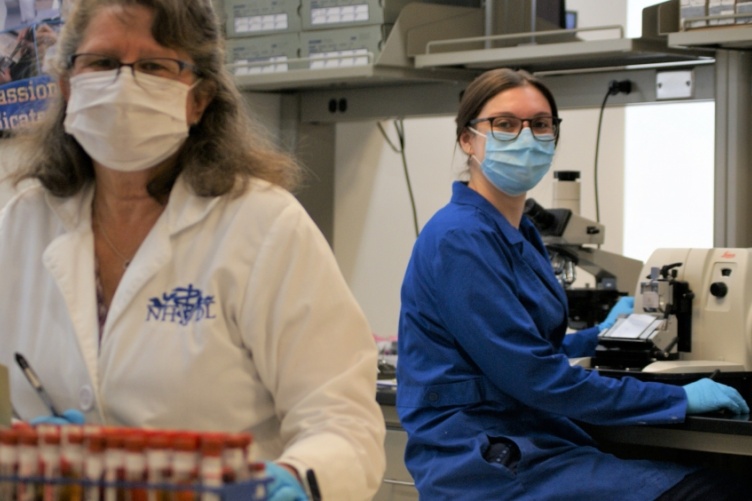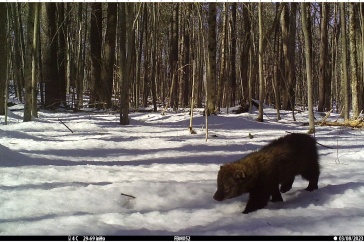
The lab provides timely diagnosis of animal diseases and remains on constant lookout for emerging and foreign animal diseases that could further threaten agriculture or public health.
As the world continues to focus on responding to the COVID-19 pandemic, New Hampshire should not let its guard down about additional diseases of potential importance to the state and nation. Pathologists and personnel at the New Hampshire Veterinary Diagnostic Laboratory at the University of New Hampshire continue to safeguard animal and public health by delivering essential services to the state and region. The lab provides timely diagnosis of animal diseases and remains on constant lookout for emerging and foreign animal diseases that could further threaten agriculture or public health.
 As part of the New Hampshire Agricultural Experiment Station in the UNH College of Life Sciences and Agriculture, the New Hampshire Veterinary Diagnostic Laboratory serves the state of New Hampshire as a key partner with the New Hampshire Commissioner of Agriculture and State Veterinarian in their efforts to monitor and respond to outbreaks of existing and emerging infectious diseases in animals.
As part of the New Hampshire Agricultural Experiment Station in the UNH College of Life Sciences and Agriculture, the New Hampshire Veterinary Diagnostic Laboratory serves the state of New Hampshire as a key partner with the New Hampshire Commissioner of Agriculture and State Veterinarian in their efforts to monitor and respond to outbreaks of existing and emerging infectious diseases in animals.
The lab also provides critical diagnostic services to hundreds of veterinarians from New Hampshire and New England who use the lab’s histopathology, microbiology, serology, and necropsy services for the diagnosis of animal diseases in pets, farm animals, wildlife, zoo, and marine animals.
“Accurately and rapidly identifying infectious agents is critical in safeguarding public health. Most infectious diseases in people are zoonotic, which means they can be transferred from animals to humans. Our ability to diagnose contagious and reportable diseases has a significant impact on treatment and outbreak response,” said Robert Gibson, managing director of the lab.
Despite the lack of 16 UNH student technicians who usually work at the lab, it is operating and offering all testing services at full capacity. To ensure staff safety, the lab is following physical distancing recommendations by rotating staff and schedules, creating new shifts on weekends and evenings, wearing face masks, increasing disinfection protocols, and implementing more stringent biosecurity. The building remains locked so that clients and package delivery services must leave samples in a foyer without entering the main building.
“The COVID-19 pandemic doesn’t lessen the threat from other animal diseases,” Gibson said. “Helping to ensure healthy animals, public health and a secure food supply requires continuous testing.” Those wanting to utilize the lab’s services should visit https://nhvdl.unh.edu/.
Fortunately, the SARS-COV2 virus has not posed a significant risk to pets. Globally, there have only been very rare cases in cats and dogs, with mild clinical signs. There have been no reports of transmission from pets back to humans. A FAQs document regarding COVID and pets is available at: https://www.agriculture.nh.gov/publications-forms/documents/sars-cov2-faqs.pdf
In recent years, the lab has diagnosed numerous new and emerging diseases detected for the first time in the state and region, some of which are zoonotic. This past November the lab diagnosed a New Delhi Carbapenem Resistant (CRE) E. coli in a dog. This antibiotic resistant ‘superbug’ is relatively new to the United States, and this was the first animal case reported in New England.
“Whether it be a new adenovirus in Chimney Swifts, respiratory diphtheria in a horse, a new strain of distemper virus in wildlife, or Valley Fever in a rescue dog from Arizona, there are numerous examples of bacterial, viral and fungal diseases diagnosed at the lab. These infectious agents may be novel discoveries, new for an animal species, or previously unknown in our region of the world,” Gibson said.
In addition to its diagnostic services, the lab serves as a critical research and educational resource for UNH students who will be part of the next generations of pathologists, diagnostic technicians, and veterinary personnel. The lab and faculty provide extensive hands-on research experience and relevant animal courses for prospective veterinary medical school applicants, giving them an advantage over graduates from other pre-veterinary programs. UNH students who apply to veterinary medical school are regularly admitted at rates well above the national average of 50 percent.
The lab serves the state of New Hampshire by providing accessible, timely, and accurate diagnostic services for the New Hampshire Department of Agriculture, Markets, & Food, New Hampshire Department of Health and Human Services, New Hampshire Fish and Game Department, state and local law enforcement agencies, veterinarians, farmers, and other relevant state, regional, and federal agencies. It is co-funded and co-managed by the New Hampshire Department of Agriculture, Markets & Food and the UNH College of Life Sciences and Agriculture. The NHVDL has served the state and the university since 1970, working at the junction of animal health, public health, environmental health, and economic health.
Founded in 1887, the NH Agricultural Experiment Station at the UNH College of Life Sciences and Agriculture is UNH’s original research center and an elemental component of New Hampshire's land-grant university heritage and mission. We steward federal and state funding, including support from the USDA National Institute of Food and Agriculture, to provide unbiased and objective research concerning diverse aspects of sustainable agriculture and foods, aquaculture, forest management, and related wildlife, natural resources and rural community topics. We maintain the Woodman and Kingman agronomy and horticultural research farms, the Macfarlane Research Greenhouses, the Fairchild Dairy Teaching and Research Center, and the Organic Dairy Research Farm. Additional properties also provide forage, forests and woodlands in direct support to research, teaching, and outreach.
-
Written By:
Lori Wright, '06G | NH Agricultural Experiment Station | lori.wright@unh.edu | 16038621452

















































